#corporate monopolies
Text

#us politics#lolbertarians#taxation is theft and other lies by lolbertarians#fuck libertarians#libertarians be like#libertarians#conservatives#memes#shitpost#bootlickers#freedom of movement#bodily autonomy#nationalistic trade policies#political violence#fascist police state#deregulation#deregulate deez nutz#corporate monopolies#privatization#property rights
489 notes
·
View notes
Text

how much is toilet paper now ?
21 notes
·
View notes
Text
For decades now, Ticketmaster has engendered bad blood from concertgoers angry over its fees but has managed to shake it off, growing into the largest ticketing company in America. But after crossing Taylor Swift fans, parent company Live Nation faced a Senate panel Tuesday intent on getting the company to admit, “It’s me, hi, I’m the problem, it’s me.”
Live Nation drew the ire of thousands of Swift fans in the fall, after its website crashed when tickets for Swift’s “Eras” tour went on sale. Swifties also decried huge swings in the tickets’ prices and painfully long wait times. A similar debacle afflicted ticket sales for a Bad Bunny concert in Mexico City. As Swift apologized to fans, Congress swore to hold hearings, and on Tuesday the Senate Judiciary Committee held the first.
Ticketmaster merged with Live Nation, a concert venue and promotions company, in 2010, creating a live events behemoth that controls nearly every aspect of putting on a show short of the singing and dancing. On Tuesday, Senators criticized how that vertical integration created a market-dominating powerhouse with little concern for average fans.
“In an ode to Taylor Swift, I will say, ‘We know all too well,’” said Sen. Amy Klobuchar, D-Minn., who chairs the Subcommittee on Competition Policy, Antitrust and Consumer Rights. “Live Nation doesn’t just dominate the ticketing — about 70% of the big concert market — but also they own many of the major venues, and for the venues that they don’t own, they tend to lock in on three-, five-, seven-year agreements, which means that the competitors that are out there aren’t able to even compete when it comes to the ticketing.”
Subcommittee ranking member Mike Lee, R-Utah, also couldn’t resist the siren’s call of a Swift allusion, prefacing his remarks by thanking Klobuchar for pushing for the hearing. “I had hoped, as of a few months ago, to get the chair back,” he said. “But once again, ‘she’s cheer captain and I’m on the bleachers.’”
The business of hosting, promoting, and selling tickets to concerts and other live events — Ticketmaster dominates pro sports ticketing, as well — is an odd one. According to the Los Angeles Times, Ticketmaster controls nearly 80% of the ticket market in the U.S., bringing in $750 million in annual profits. It seems like just a middleman between the musician and the concertgoer. But Ticketmaster’s real customers aren’t fans — who have little choice in how to buy their tickets — but the venues (often owned by Live Nation) and the musicians. And as some of those customers, including Garth Brooks and the Atlanta Braves, attested in written testimony, Ticketmaster has treated them extremely well.
“What I witnessed [working with Ticketmaster] was a true concern and care for ticket buyers,” wrote Brooks.
As some of Swift’s exes can attest, a tongue lashing may sting in the moment but leaves few lasting scars. Live Nation and Ticketmaster have a long history of essentially selling themselves as the bad guy to the public, allowing bands and arenas to scapegoat the company for their own greedy pricing decisions. Tuesday was more of the same, albeit under the glare of a congressional spotlight.
“Primary ticketing companies, including Ticketmaster, do not set ticket prices. We do not decide how many tickets go on sale and when. And we do not set service fees. Pricing and distribution strategies are determined by artists and their teams. Service fees, even if called ticketing fees, are retained mainly by venues,” said Live Nation President Joe Berchtold.
Berchtold does face a more tangible risk than just the verbal berating he received, however, if the Senators decide to do more than take advantage of the extra media attention to get themselves on TV and instead turn to legislating.
After nearly 50 years of Congress and the courts endorsing a laissez-faire approach to the antitrust regime, one ostensibly couched in terms of maximizing consumer welfare by permitting efficiency-driving mergers, members of both parties now are questioning the concentration of corporate power that has resulted. President Joe Biden’s picks to run the Federal Trade Commission and Department of Justice’s Antitrust Division — Lina Khan and Jonathan Kanter, respectively — have been far more aggressive in challenging mergers and enforcing consent decrees than their predecessors from both Republican and Democratic administrations.
As part of the 2010 merger, Live Nation entered a consent decree with the DOJ to refrain from retaliating against musicians who didn’t use its venues and pay $1 million for each violation. The DOJ and Live Nation extended that decree in 2020. The DOJ also reportedly opened a separate investigation into Live Nation in November, following the Swift ticket fiasco.
In recent years, bipartisan legislation aimed at creating a more hawkish competition policy has been brewing in both chambers, with Klobuchar working closely with Lee and Sen. Charles E. Grassley, R-Iowa. Congress passed a bill last year increasing the fees that large companies proposing mergers must pay, but more aggressive measures did not reach the president’s desk. Similar bills passed the House last year but ran out of time in the Senate, despite Grassley’s insistence that they had enough Republican votes to defeat a filibuster.
The hopes of passing stronger antitrust laws dimmed after the midterm elections. While some Republicans, including deeply conservative House Freedom Caucus members like Ken Buck of Colorado, support tougher measures, most of the party remains skeptical, including House Judiciary Chairman Jim Jordan of Ohio and Speaker Kevin McCarthy of California.
COMPETITORS PILE ON
Live Nation’s competitors seized their chance to pile on Tuesday, calling for its breakup. “As long as Live Nation remains both the dominant concert promoter and ticketer of major venues in the U.S., the industry will continue to lack competition and struggle,” said Jack Groetzinger, CEO of SeatGeek, a ticketing company.
“Pepsi doesn’t earn money from Coke, but our competitor, Live Nation, makes money from selling tickets to our concerts,” said Jerry Mickelson, CEO of Jam Productions, which runs concert venues in Chicago. Mickelson described how Live Nation used its market dominance to push his company out of the arena concert business using allegedly monopolistic tactics.
Antitrust policy fans hoping the hearing might draw Swift’s star power had to settle for Clyde Lawrence, singer for the band Lawrence, which included the lyric “Live Nation is a monopoly” on one of its latest releases.
Lawrence countered some of Live Nation’s claims of being just an agent of the artists, alleging the company dictates fees and terms for smaller acts like them — in effect, creating a two-tier system for musicians in which smaller bands can’t negotiate the way bigger acts can.
Bands set the ticket price while the venues set the fees, Berchtold said in response. That didn’t sit well with Judiciary Chair Richard J. Durbin, D-Ill.
“You control the venue, do you not?” he asked.
Ticketmaster’s practices have long irked fans and bands alike. Pearl Jam launched a campaign against Ticketmaster in the ’90s, testifying before a House panel against the company’s price-stoking strategies.
Not every Senator on Tuesday’s panel joined in the Ticketmaster bashing. Louisiana Republican John Kennedy rolled his eyes at the witnesses attacking the company’s practices. “If you care about the consumer, cap the price, cut out the bots, cut out the middle people,” said Kennedy. “And if you really care about the consumer, give the consumer a break. Not every kid can afford, whatever it is, $500 to see Taylor Swift.”
#us politics#news#roll call#music#celebs#celebrities#taylor swift#ticketmaster#concert tickets#live nation#corporate monopolies#Senate Judiciary Committee#us senate#Sen. Amy Klobuchar#Subcommittee on Competition Policy Antitrust and Consumer Rights#sen. mike lee#Joe Berchtold#sen. chuck grassley#rep. Ken Buck#rep. kevin mccarthy#rep. jim jordan#Jerry Mickelson#Jack Groetzinger#seatgeek#jam productions#Clyde Lawrence#sen. dick durbin#sen. john kennedy#2023
13 notes
·
View notes
Link
If you live in the Seattle area, chances are it’s at one of four stores involved in the potential merger of supermarket chains Kroger and Albertsons.
On Friday, Kroger announced plans to purchase Albertsons in a $20 billion deal. In the Seattle area, Kroger owns the QFC and Fred Meyer chains while Albertsons owns its eponymous stores and Safeway.
0 notes
Text
sorry this is a day late but in light of the funimation debacle my recommendations for free streaming are wcostream and 9anime. between the two i've found that the quality on 9anime is a little bit better for older shows – like, say, the original Saint Seiya, which is 90% of what I use 9anime for – but as with many things I'm sure your mileage may vary.
I watch them in Firefox with an additional adblock extension running, because i'm a woman of a certain generation and i fundamentally can't trust any anime or manga site, but i've never had issues with either of them! still tho, if you're a Chrome user, get Firefox and throw an adblock on it, just in case. you can absolutely get Firefox exclusively for watching anime if you want to, treat yourself to something nice. ✨
i'm out of the game on torrenting/actual piracy so I can't help anybody with that rn. u_u idk what the method is these days. I got most of my files in swaps with friends and anime club members anyways. Once in 2016 I tried to properly torrent HxH and it didn't work and i couldn't figure out what went wrong so i gave up lmao
#not hxh#it's dangerous to go alone! take this! [throws adblocks on everyone's browsers]#(no but literally this was me at work today too. which is... yall we have a tech department why isn't this standard????)#anyways. corporations are a fuck and monopolies are evil. trust no bitch and save your faves.
138 notes
·
View notes
Text
Thankful for class consciousness
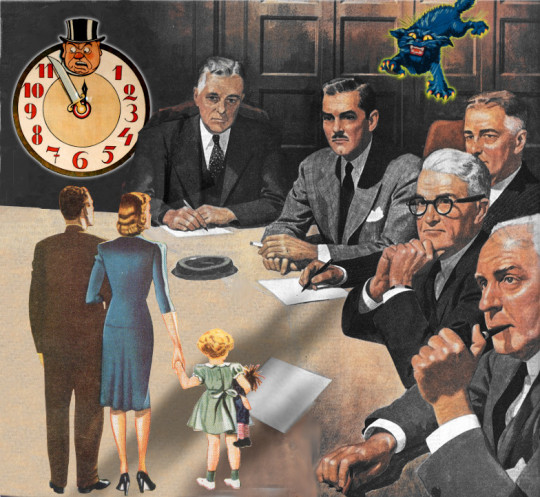
On November 27, I'm appearing at the Toronto Metro Reference Library with Facebook whistleblower Frances Haugen.
On November 29, I'm at NYC's Strand Books with my novel The Lost Cause, a solarpunk tale of hope and danger that Rebecca Solnit called "completely delightful."

Before the term "ecology" came along, people didn't know they were on the same side. You care about owls, I care about the ozone layer – what does the destiny of charismatic nocturnal avians have to do with the gaseous composition of the upper atmosphere?
But as James Boyle has written, the term "ecology" welded together a thousand issues into a single movement. When we talk about "looking at our world through a lens," this is what we mean – apply the right analytical lens and a motley assortment of disparate causes becomes a unified, coherent project:
https://scholarship.law.duke.edu/cgi/viewcontent.cgi?article=1013&context=dlj
Unfettered, planet-destroying, worker immiserating corporate power is only possible in the absence of such a lens. Before neoliberalism can destroy our lives, it must first convince us that we are all disconnected. "There is no such thing as society," isn't just an empty slogan: it's a weapon for dismantling the democratically accountable structures that can stand against industrial tyrants.
That's why neoliberalism is so viciously opposed to all kinds of solidarity, why corporate apologists insist that the only elections that matter are the ones where you "vote with your wallet." It's no surprise that the side with the thickest wallets wants to replace ballots with dollars!
Today, at long last, after generations of deadly corporate power-grabs, we are living through an ecology moment where all kind of fights are coalescing into one big fight: the fight to save democracy from oligarchy.
There are many tributaries flowing into this mighty river, but two of the largest are antitrust and labor. Antitrust seeks to ensure that our world is regulated by democratically accountable lawmakers who deliberate in public, rather than shareholder-accountable monopolists who deliberate in smoke-filled rooms. Labor seeks to ensure that contests between profit for the few and prosperity for the many are decided in favor of people, not profit.
This coalition is so powerful that the ruling class has never stopped attacking it. Indeed, the history of US antitrust law can be viewed as a succession of ever-more-insistent laws enacted solely to make it clear to deliberately obtuse judges that competition law is aimed at corporations, not unions:
https://pluralistic.net/2023/04/14/aiming-at-dollars/#not-men
Rising corporate power and declining worker power is bad for all of us. The failure of successive US administrations to block airline mergers led to sky-high prices and a proliferation of "junk fees" that can double the price of a ticket. The monopoly carriers stand to make $118b this year from these fees:
https://www.fastcompany.com/90981005/airlines-fees-118-billion-dark-patterns
The consolidation of the agricultural sector led to cartels that conspired to rig the prices of our food. These Les Mis LARPers rigged the price of bread!
https://www.cbc.ca/news/business/canada-bread-price-fixing-1.6883783
Remember eggflation? Nearly all the eggs in US grocery stores come from a single company, Cal-Maine, which owns dozens of brands, including "Farmhouse Eggs, Sunups, Sunny Meadow, Egg-Land’s Best and Land O’ Lakes eggs":
https://www.cnn.com/2023/01/13/business/egg-prices-cal-maine-foods/index.html
With all our eggs in one basket, it was easy for a single company to rig the egg market, blaming everything from bird flu to Russian invasion of Ukraine for doubling egg prices while their profits shot up by 65%:
https://pluralistic.net/2023/01/23/cant-make-an-omelet/#keep-calm-and-crack-on
Antitrust isn't just about monopoly – it's also about oligopoly. The American meat cartel pretends that it's not rigging markets by outsourcing its price-fixing to a "clearinghouse" called Agri Stats:
https://pluralistic.net/2023/10/04/dont-let-your-meat-loaf/#meaty-beaty-big-and-bouncy
Agri-Stats gets data from all the Big Meat companies, "anonymizes" it, and publishes it back to its subscribers, who use the service to coordinate across-the-board price-hikes that have cost the public billions in price gouging (meanwhile, Big Meat was able to secure $50b in public subsidies).
For forty years, governments have ceded power to "autocrats of trade" who usurped control "over the production, transportation, and sale of the necessaries of life":
https://pluralistic.net/2022/02/20/we-should-not-endure-a-king/
But that era is coming to an end. In the past year, American regulators have blocked airline mergers and promulgated rules banning junk fees. They've dragged price-fixing clearinghouses into court:
https://www.thebignewsletter.com/p/why-turkey-eggs-and-air-travel-just
They're getting results, too: for the second year in a row, turkey prices are down. Cranberries, too (18%). Same for whipping cream (25%). Pie crusts are down. So are russet potatoes. Airfares are down 13.2%.
The egg cartel just lost a long-running court case over the last egg price-fixing campaign, which gouged Americans from 1990-2008:
https://www.pymnts.com/cpi_posts/kellogg-kraft-secure-victory-in-price-fixing-lawsuit-against-egg-producers
The same fact-pattern that was revealed in that court case is repeated in this year's eggflation scandal:
https://farmaction.us/wp-content/uploads/2023/01/Farm-Action-Letter-to-FTC-Chair-Lina-Khan.pdf
That's terrific ammo for the FTC, and will doubtless benefit the Democrats running against would-be Indiana senator John Rust, whose family owns convicted egg cartel member Rose Acre Farms and whose wife just stepped down as chair of the board.
One underappreciated aspect of the global war on corporate power is that the same corporations commit the same crimes in countries all over the world, which means that whenever any government establishes evidence of those crimes, they are of use to all the other governments. Competition enforcers from the UK, EU, USA, Singapore, South Korea and elsewhere are coordinating to target the Big Tech cartel. Maybe Google and Facebook and Apple are bigger enough to resist any one of those governments – but all of them?
https://cmadataconference.co.uk/
One notable absence from the anti-monopoly coalition is Canada. While other countries merely stopped enforcing their competition laws in the neoliberal era, Canada never had a good competition law to enforce. Canada's official tolerance for monopolies has allowed a handful of companies to seize control over the economy of Canada and the lives of Canadians:
https://www.canadaland.com/shows/commons-monopoly/
These monopolies are largely controlled by powerful families, Canada's de facto aristocracy, whose wealth and power make them above the law and subordinate the country's democratic institutions to billionaires' whims:
https://www.canadaland.com/tag/dynasties/
At long last, Canada has called time on oligarchy. Last week's Fall Economic Statement included an announcement of a muscular new competition law, including new merger guidelines, a new "abuse of dominance" standard, and Right to Repair rules:
https://www.linkedin.com/feed/update/urn:li:activity:7132855021548769282/
The law also includes interoperability mandates for Canada's highly concentrated – and deeply corrupt – banking sector. These measures are strikingly similar to new measures just introduced in the US by the CFPB:
https://pluralistic.net/2023/10/21/let-my-dollars-go/#personal-financial-data-rights
The arrival of Canada's first fit-for-purpose competition rule coincides with all kinds of solidaristic movements in Canada that are fighting corporate power from the bottom up. Even Ontario, led by one of the most corrupt premiers in provincial history, can't break its teachers' union:
https://globalnews.ca/news/10105600/ontario-elementary-teachers-reach-contract-deal/
It's not just workers who benefit from solidarity: Tenants' unions have formed across the province in response to corporate takeovers of scarce rental stock. These finance-sector landlords have armies of lawyers who've figured out how to bypass rent-control rules and evict tenants who balk. Rather than rolling over, tenants' unions are organizing waves of rent-strikes:
https://macleans.ca/longforms/rent-strikes-canada/
As with Big Tech, the illegal tactics of the rental sector aren't confined to a single nation. In America, Wall Street landlords have dramatically increased the price of housing and kicked off an eviction epidemic the likes of which the country has never seen:
https://pluralistic.net/2023/05/16/mortgages-are-rent-control/#housing-is-a-human-right-not-an-asset
And as with Big Meat, landlords use arm's-length clearing houses to rig rental markets, coordinating across-the-board rent hikes:
https://www.propublica.org/article/yieldstar-rent-increase-realpage-rent
In other words: to fix the housing market, tenants all over the world need to learn the tactics of labor unions. Housing regulators have to learn from agricultural regulators. Americans tenants have to learn from Canadians. These aren't 1,000 different fights – they're one big fight, and the coalition for dismantling corporate power is vast and powerful.
The most powerful weapons our bosses have is convincing us that we are weak and they are strong – so strong that we shouldn't even try to fight them. But solidarity is absurdly powerful, which is why they go to such great lengths to discredit it. In Sweden, the solidarity strikes against Tesla – who refuses to recognize its maintenance workers' union – have spread to nine unions.
Tesla can't get its cars offloaded at the ports. It can't get its showrooms cleaned. No one will deliver its mail. No one will fix its chargers. The strike is spreading to Germany, and workers at its giant Berlin factory is set to walk out:
https://www.metafilter.com/201514/Swedish-Tesla-workers-go-on-strike
There's something delicious about how palpably frustrated Elon Musk is by all this, as he realizes that neither his billions nor his bully pulpit are a match for workers in solidarity:
https://www.bloomberg.com/news/articles/2023-11-23/elon-musk-calls-swedish-tesla-strikes-insane-as-impact-spreads
It's a reminder of just how fragile and weak billionaires are, when we stop believing in them and deferring to them. Rebecca Solnit's latest Guardian column adds up the ways that allowing billionaires to run the show puts us all in danger:
https://www.theguardian.com/commentisfree/2023/nov/20/billionaires-great-carbon-divide-planet-climate-crisis
They are the unelected "autocrats of trade" who control "the production, transportation, and sale of the necessaries of life." They are the force that this new ecology movement is coalescing to fight: across borders, across sectors, across identities. No matter whether you are a worker, a tenant, a voter, a shopper or a citizen, your enemy is the billionaire class.

If you'd like an essay-formatted version of this post to read or share, here's a link to it on pluralistic.net, my surveillance-free, ad-free, tracker-free blog:
https://pluralistic.net/2023/11/24/coalescence/#solidarnosc
#pluralistic#james boyle#ecology#corporate power#monopoly#monopolism#eggflation#euthanizing rentiers#money beats ethics#incentives matter#sam altman#open ai#junk fees#cartels#aviation#billionaires#rebecca solnit#price fixing#Rent strike#canada#canpoli#toronto#the rents too damned high#weaponized shelter#tenants union#unions#tesla#sweden#labor#moral injury
100 notes
·
View notes
Text
Telling content creators it's wrong to explore artistic freedom and be independently funded by fans, and they should instead continue taking advertisement revenue from google* is
NOT
the anti-capitalism stance actually.
*(Yes, google owns youtube.)
#Watcher#This post is specifically and exclusively about the people who seem to have the capitalism bit wrong#It's almost fascinating how no one is hearing themselves speak#I feel like some of you don't understand WHY we support small businesses and are anti-monopoly#I've seen multiple posts saying “Shane is so anti-capitalism there's no way this was his idea.”#So... you think it's pro-capitalism to start your own business instead of relying on pennies from the exploitative mega-corporation?#Guys... we support small businesses KNOWING it will cost the consumer more#Stop thinking you're entitled to someone's product#That's what got us in this mess#I understand $6 is a lot for many many people but that is what makes certain things a luxury#Nothing used to be this way#Nothing used to be “free” so you can be monitored for your viewing habits and sold to advertisers#If you see a little guy trying to leave youtube/google and you paint them as the capitalist??? You. have. taken. a. wrong. turn.#I don't know how many more ways I can say it#It is better to support someone (if you can) than to pressure them into taking money from the trillion-dollar corporation#so that you can have what they put all their blood/sweat/tears into for free#If you want something badly enough you're going to have to pay for it#Them's the breaks#If you don't want it that badly then maybe it didn't mean enough to you personally#Thinking otherwise is how corporations like youtube take over and squeeze out small competitors#btw on monopolies: having almost every single video content creator (outside of tiktoks and video game streams) on youtube is BAD#You understand that's bad yes?#How tf are we going to diversify unless SOME CREATORS leave youtube???#It's almost the responsibility of larger creators to do so#Ironically what I said is backwards#In its ideal state‚ capitalism is supposed to inspire innovation and new business‚ giving every person a chance to succeed#But I think we all know that's not the reality we're experiencing#I just went with what everyone means when they say it
31 notes
·
View notes
Photo
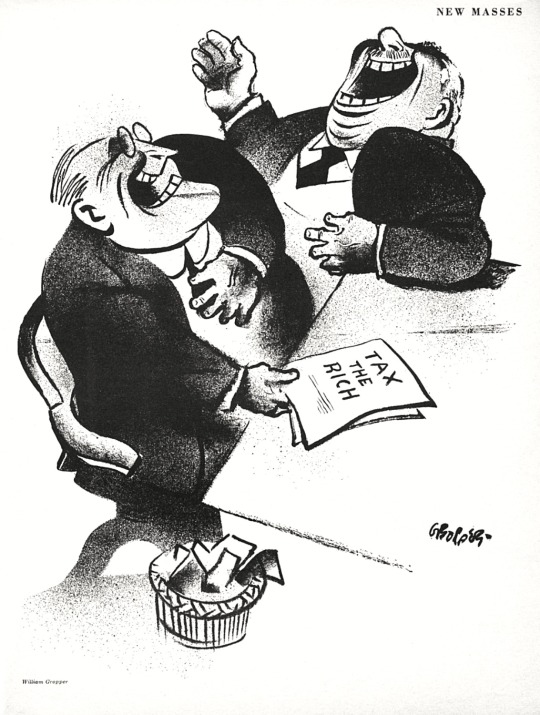
“Tax The Rich“
William Gropper
New Masses Magazine
United States of America
July 9, 1935
#american#cartoon#tax the rich#rich#bourgeoisie#tax#corporation#anti-capitalism#monopoly#usa#united states
156 notes
·
View notes
Link
“The Justice Department and a group of eight states sued Google on Tuesday, accusing it of illegally abusing a monopoly over the technology that powers online advertising, in the agency’s first antitrust lawsuit against a tech giant under President Biden and an escalation in legal pressure on one of the world’s biggest internet companies.
The lawsuit said Google had “corrupted legitimate competition in the ad tech industry by engaging in a systematic campaign to seize control of the wide swath of high-tech tools used by publishers, advertisers and brokers to facilitate digital advertising.”
The lawsuit asked U.S. District Court for the Eastern District of Virginia to force Google to sell much of its suite of ad technology products, which include software for buying and selling ads, a marketplace to complete the transactions and a service for showcasing the ads across the internet. The lawsuit also asked the court to stop the company from engaging in allegedly anticompetitive practices...
The new lawsuit “adds another important complication to Google’s efforts to deal with regulators worldwide,” said William Kovacic, a former chairman of the Federal Trade Commission. “There’s a chance one or more of these challenges is going to make its way through and hit the target...”
Attorney General Merrick B. Garland said monopolies “threaten the free and fair markets upon which our economy is based.” He added, “We will aggressively protect consumers, safeguard competition and work to ensure economic fairness and opportunity for all.”
The Biden administration is trying to use uncommon legal theories to clip the wings of some of America’s largest businesses. The F.T.C. recently asked a judge to block Meta from buying a virtual-reality start-up, a rare case that argues a deal could harm potential competition in a nascent market. The agency has also challenged Microsoft’s $69 billion purchase of the video game publisher Activision Blizzard, a notable action because the two companies are not primarily seen as direct competitors.
These efforts are expected to meet fierce resistance in federal courts. Judges have for decades subscribed to a view that antitrust violations should mostly be determined by whether they increase prices for consumers. But Jonathan Kanter, the chief of the Justice Department’s antitrust division, and Lina Khan, the F.T.C. chair, have said they are willing to lose cases that allow them to stretch the boundaries of the law and that put corporate America on notice.”
-via The New York Times, 1/24/23
#justice department#doj#merrick garland#biden#google#online ads#advertising industry news#advertising#monopoly#antitrust#us politics#corporations#big tech#good news#hope
210 notes
·
View notes
Text
TL;DR capitalism is killing babies


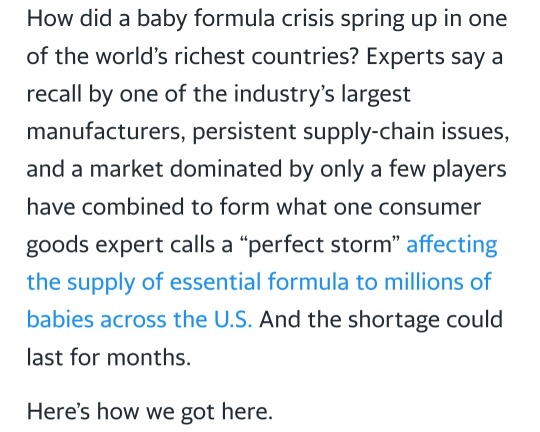
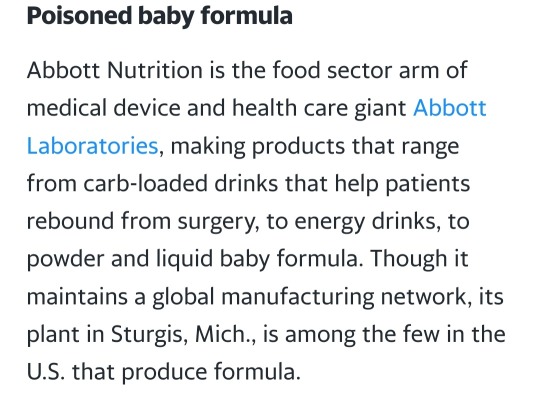

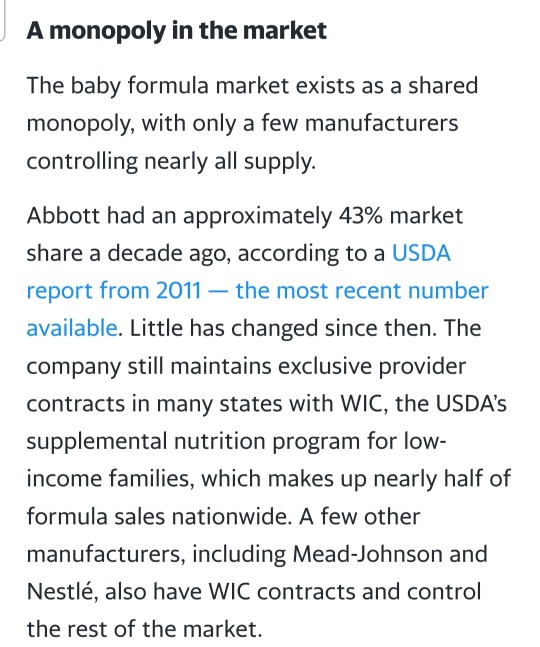
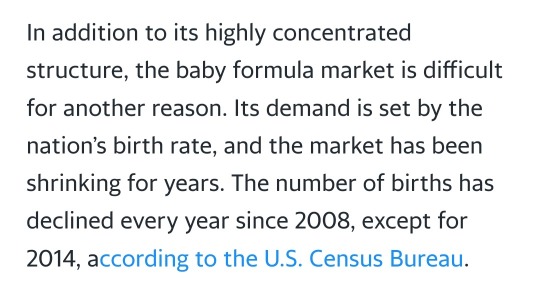


#news#world news#politics#usa#leftist#capitalism#end stage capitalism#late stage capitalism#leftism#monopoly#parenting#human rights#greed#nestle#johnson and johnson#corporation#i dont want to live on this planet anymore#dystopia#dystopian
828 notes
·
View notes
Note
hello are you single? I only ask because your tags on this watcher post have me feeling like I should go and shop for rings https://www.tumblr.com/strangefable/748213037387939840?source=share
LMAO thank you for this <3 i do think there are some reasonable critiques to be made on this decision, but a lot of what i'm hearing is entirely not reasonable. it's tough out here for all of us, and that includes the team at watcher. they're not wrong to want to make their company sustainable while maintaining creative control. the audience is not owed 'free' content. (and it's not free, kids! you're the one being sold to data-miners and advertisers when the content is 'free')
i'm lucky enough to be in a place where i can afford it, and i'd much rather pay watcher than netflix or disney etc. i don't believe ryan, shane, and steven are so out of touch that they only want money. they love their shows. they care that what they make is something they are passionate about and invested in. but that's still gonna cost money in our current society; this is just the reality we live in
#i get that it sucks for a lot of the audience and it does suck#but the current yt model is not sustainable for anyone#like. i hate to break it to people but yt is google is a monopoly#if we have any hope it's to continue to disrupt the status quo#we have to support smaller artists and indie endeavors and get art out from under the thumb of greedy corporate interests#capitalism is most certainly killing us all but the guys at watcher aren't the problem
11 notes
·
View notes
Text
profits over people — the corporate hellscape of internet censorship, safety, privacy, data mining…
#capitalism#internet censorship#internet#data mining#profit over people#apple#microsoft#kosa#chrome#google#privacy#privacy protection#internet privacy#monopoly#european union#eu#corporate hellscape#kids online safety act#2024
11 notes
·
View notes
Text
Want to know why prices are going up?
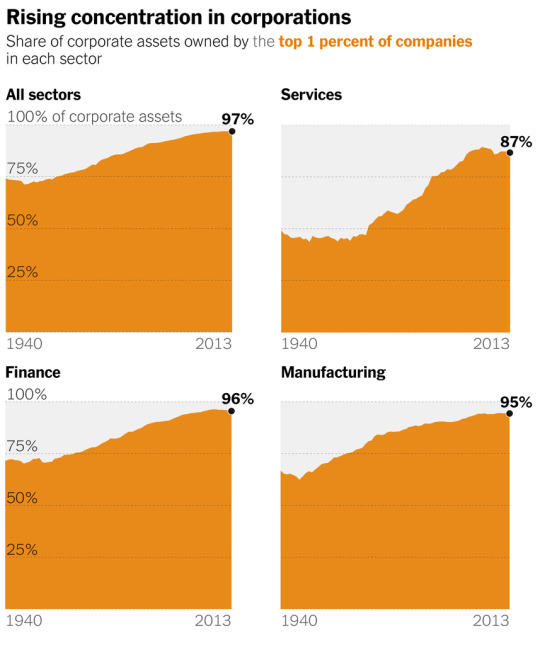
Monopolies.
Chart - NY Times
32 notes
·
View notes
Text
Long Loading Times on YouTube Videos?
for my Firefox-using followers who may have noticed that Youtube now takes 8 years to load a video, it's because they're in bed with Google and intentionally making videos take an extra 5 seconds to run on anything but chrome
the solution? firstly, disable cookies so they can't see if you're using an adblocker or anything of the sort
second, install this add-on:
and then to set it up, here's what you do
select Extensions in the top right corner, looks like a little puzzle piece
select User-Agent Switcher and Manager
it'll pull down the menu below, make sure chrome is selected in the top left box and whatever OS you're running
delete existing text in the box at the bottom of the menu, then select the button for the latest version of chrome
the agent ID will appear in the box, then you just click Apply(containter) at the bottom right
Youtube should load with zero issues after that
stick it to the man

#this whole time I thought my pc was just slowing down#nope#big tech corporate monopolies once again#this is why google is getting sued#youtube#google#firefox#chrome#tech support#add-ons
16 notes
·
View notes
Text
Valve fact! There are eight official Valve board (or similar format) games! Six for Team Fortress, one for Portal, and one for Dota.
Team Fortress games:
Gargoyles and Gravel puzzle: https://www.amazon.com/USAOPOLY-PZ120-521-Fortress-Gargoyles-Multicolor/dp/B074Z3T25Z

Crossword puzzle: https://www.teamfortress.com/post.php?id=2562

Monopoly: https://wiki.teamfortress.com/wiki/Monopoly:_Team_Fortress_2

Chess: https://greenland.desertcart.com/products/5273304-exclusive-team-fortress-2-chess-set-red-vs-blue-by-think-geek

Turn based game: https://bernardhwang.com/table-top-games/tf2-conversion

Attack and Defend: https://www.stephanhaldaman.com/team-fortress-2.html
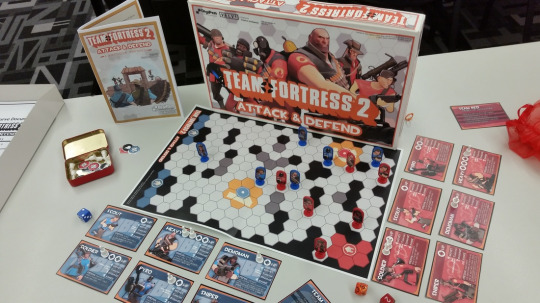
Portal
Portal the Uncooperative Board Game: https://www.amazon.com/Cryptozoic-Entertainment-Portal-Uncooperative-Board/dp/B00TVQ00BI
(Bonus interview with Jeep Barnett, a Portal developer but also the designer of the board game! https://youtube.com/playlist?list=PLlVZS5wPRFe_9a69FXlYosLsREgPS0Odd&si=qxRo-rn1WlWsLtXO)

Dota
Artifact: https://store.steampowered.com/app/583950/Artifact/
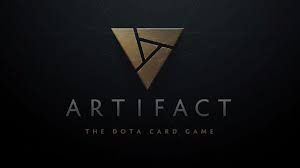
I'll add any more official ones when I find them! Sorry about the messy formatting.
#valve#valve games#gabe newell#Valve Corporation#Valve Software#board game#video game#monopoly#portal#dota#team fortress#team fortress 2#tf2#card game
15 notes
·
View notes